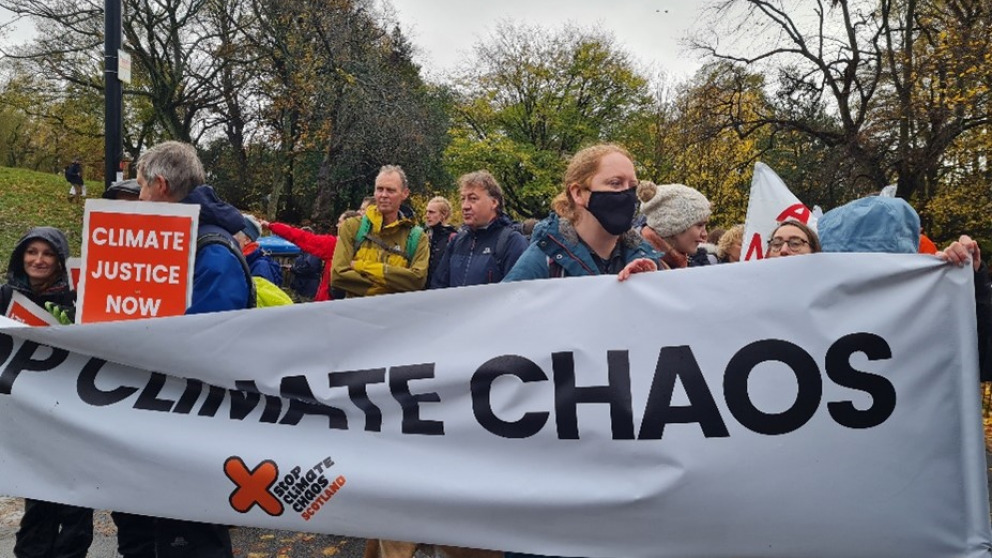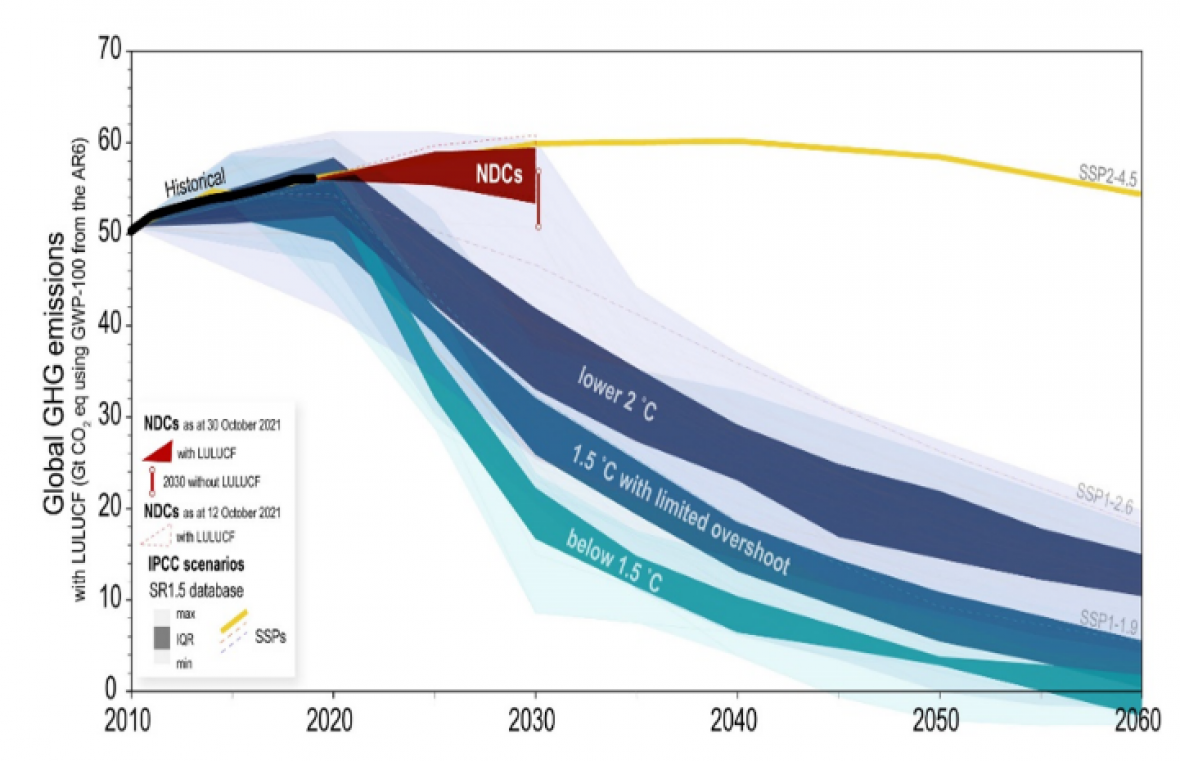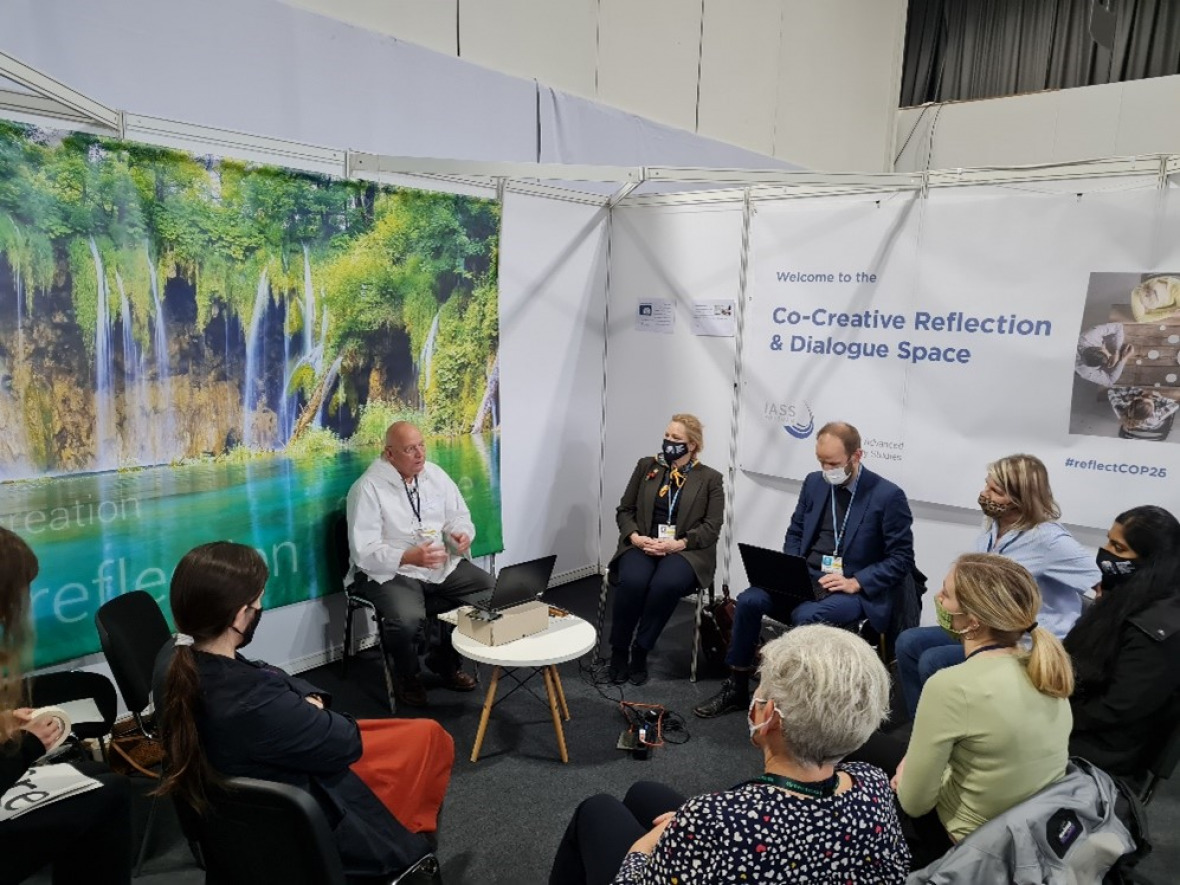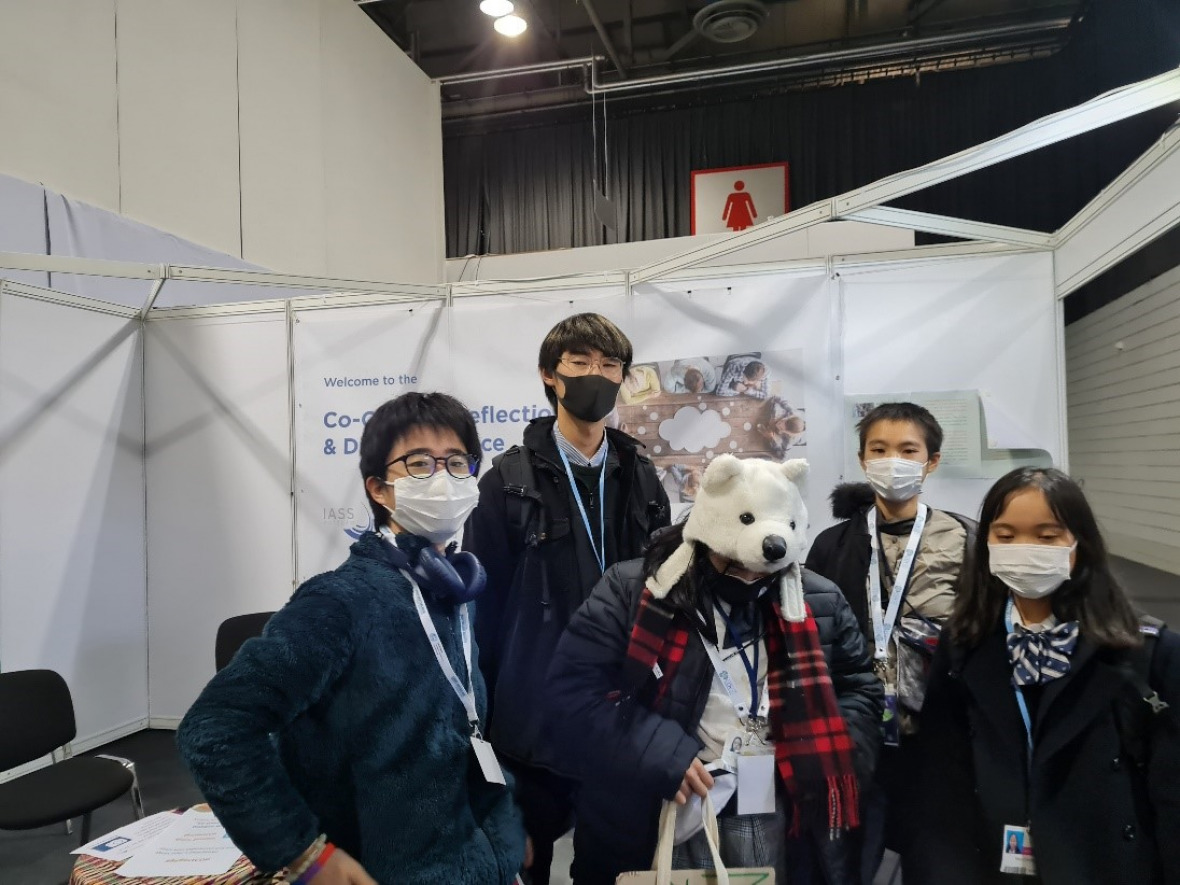Reflections, queries and insights from COP26
22.11.2021

Are the annual Conference of Parties (COPs) for global agreements on climate change reinforcing a false sense of security?
The Paris Agreement, which is a legally binding international treaty with the goal to limit global warming to well below 2, preferably to 1.5 degrees Celsius, compared to pre-industrial levels, might be instilling in us a false sense of security, warned two scientists from IASS already back in 2019. The two scientists concluded that ''keeping global warming below 2 degree Celsius would require a reduction of CO2 emissions by -3 % per year. Such a rapid decrease of Co2 emissions would require extensive societal, industrial, technological, and other transformations. Yet such global needs for transformations are not collectively reflected in the current NDCs (nationally determined contributions)''. Their warning was also validated by the 2021 IPCC report when it reported that actions to reduce emissions are not commensurate with the temperature goals. Explaining this disconnect, the two scientists stated that global temperature goals rather than actual mitigation and adaptation plans were ''attractive to politicians because they can allow political purposes to be fulfilled without necessarily having any specific actions follow'' from their public pronouncements.

Fast forward now to COP26, where I stand in the blue zones for the political delegates. COP26 stands for the 26th Conference of Parties to the UNFCCC. The Paris Agreement was agreed at COP21 and we are now at COP26.
The COP is the supreme decision-making body of the Convention on Climate Change. I try to make sense of what I am seeing at COP26, wondering if I might put it into writing later. I am struck by the cognitive dissonance between our predicament and the atmosphere of ‘show’ here. In every pavilion I visit, countries, businesses, and development organizations are sending a message of doing great work over climate actions. It is very odd considering we know we aren’t doing enough, as shown by that IPCC report and the latest update to the NDCs (Nationally Determined Contributions) Synthesis Reports published for the COP26 (see Figure 1).
I imagine that there are a lot of good intentions but an inability to face the implications of the current non-ambitious NDCs to reduce emissions. I suddenly feel like we are in the matrix; it is a blue zone as most have taken the blue pills. We are afraid to admit we are failing, I sigh, because we are afraid of the feelings that threaten us. “Climate change”, wrote a group of climate psychologists, “threatens us with powerful feelings—loss, guilt, anxiety, shame, despair—that are difficult to bear and mobilize defences such as denial and distortion which can undermine our capacity to get to grips with the issue”. So we might be shutting such feelings out using defence mechanisms such as denial, rationalization, splitting and dissociation. I feel this strongly at COP26 in Glasgow.
Why is such a space needed at the COP?
One of the scientists who has not taken the blue pill is Mark Lawrence. As a result, he has worked together with a team at IASS, led by Carolin Fraude and including myself, to set up a space for co-creative reflection and dialogue. The space is intended to be different from frontal communication by experts and policy makers. It is intended instead to be conducive for democratic governance by enhancing meaningful reflection, listening and relating among COP participants.
Why is such a space needed at the COP? The world might be waiting for more new deals and commitments right now from the COP delegates but what we also badly need at COP26 is to have meaningful reflection on why countries are not ambitious enough in their NDCs to sufficiently halve the global emissions by 2030 and reaching ‘net-zero’ by 2050, in order to safeguard limiting warming to 1.5C. In addition, we need to deeply reflect why it is so hard for rich countries to not only engage in loss and damage compensation, but also to honour their 2009 promise of mobilising increased finance for climate action in developing countries (the goal of USD 100 billion per year has not yet been reached) in order to support justice-based transitions.
Such space for deep reflection is needed as studies show that such dialogic, deliberative processes can open minds, deepen understanding, foster empathy, change attitudes, and increase receptivity to policy alternatives. By contrast, negotiators often assume that economic gains and relational outcomes are in conflict and that negotiators should sacrifice their own economic gains to maintain the relationship.
Research however shows that a co-operative conversation can increase the chance of a favourable deal and improve relationships during negotiations. This means that such a space to practice cooperative dialogue could influence outcomes of negotiations. Indeed, research on COP culture by the project partners shows that COP participants would like to see new ways of communication and collaboration, based on more relational modes of knowing, being and acting.
To support the possibility of such meaningful reflection and engagement, we are applying, together with our partners, facilitated approaches, ranging from disciplines and spiritual practices within deep ecology, mindfulness, psychology, embodiment, to deepen the art of reflection, listening and relating. During the facilitated sessions, we hear of the multiple and divisive narratives on climate change. The abstract nature of climate change encourages, according to several participants, a technical problem-solving mindset rather than a holistic open-hearted approach. We hear participants express how they feel the conversation on climate change is siloed.
There is a box here called ‘climate’ in which politicians discuss the climate, another box called biodiversity, in which they discuss the biodiversity crisis, and another box called food in which they discuss the food crisis. There are plenty of boxes but they amount to the same: human activities. “We need collective action (on these human activities) and resetting our values”, a participant expresses. Yet, many feel actions on climate change are promoting siloed thinking, technological reliance and global capitalism. “Even if we achieve the 1.5C goal” says Mark Lawrence, “we could still have a pretty horrible world, with even more inequality and loss of nature”.

Someone comments, during a session on the role of social media for a more inclusive COP, that even Greta Thunberg’s narrative of “blah blah blah” can be problematic . ''This is no longer a climate conference. This is a global North greenwash festival. A two-week celebration of business as usual and blah blah blah'', Greta had tweeted. It reminds me of a previous session on leadership towards a place of love, when Maureen Goodman from the Brahma Kumari expresses ''how there is no space for love at COP26, yet everywhere you see the longing in people for this''.
Greta’s narrative of blah blah blah might ignore the longings in many of the COP delegates that are being blocked somehow. What is it about the COP culture that prevents the delegates to deeply listen and deeply relate, a Kenyan representative seems to ask us? ''As soon as I enter this space'', he says, ''I feel disconnected from my people, and I cannot represent them. I feel the separation between them, rich countries, and us, poor countries''. Something is obviously wrong in the COP culture, which our (IASS) previous research also infers. The current COP culture might be hindering not only cooperative dialogue but acceptance of our current predicament; that we are good at making commitments on temperature goals but not good at following it with actions commensurate with the temperature goals.
In more sessions to explicitly explore the emotions around climate change, many of the COP delegates expose the cognitive dissonance of COP26. I am crying as one of the participants, tuning deep in his grief, shares the realization of what he just experienced; that he is feeling strongly in his body that he is at a funeral that nobody wants to see. I am too tearful to ask him whether it is the funeral of the planet or the funeral of the COP.
Another participant, a 21-year-old Korean climate activist, shares a disconcerting moment of cognitive dissonance when she questioned her government over dubious data on NDCs reporting. The Korean government thanked her and then responded that as it was not a question, they would move on with the conversation. The Korean activist is in tears as she expresses how humiliated she is feeling. Another participant expresses how hard it was for her to witness an indigenous person being shut down for challenging why indigenous people were not consulted in the deforestation deal. A 21 year old Latvian shares her wisdom with us. " I see that we cannot change decision-making here (at COP26)", she said, "but we can escape the delusion that they will do it for us. We can return to our communities open eyed and contribute from the ground to a new climate revolution".

As climate experts digest COP26, here is their conclusion: “Before COP26, the world was on track for 2.7°C of warming, based on commitments by countries, and expectation of the changes in technology. Announcements at COP26, including new pledges to cut emissions this decade, by some key countries, have reduced this to a best estimate of 2.4°C”.
For me, as I also process all I have witnessed and experienced, I see more clearly than ever that not being attuned to our bodies, as we experience the reality of our NDCs, is moving us into ‘experiential avoidance’, where we suppress natural emotions, in particular our fears, arising in response to our predicament. I grieve that, at a time of crisis, I see clearly that the climate and participation revolution that we also need right now has not happened at COP26. But as the Latvian youth advised, I go home more open eyed and will contribute from the ground to the new climate revolution.
